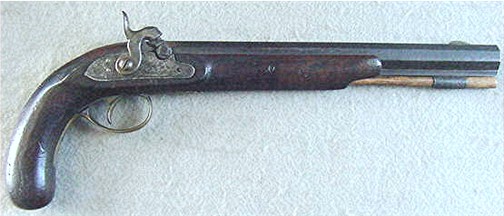|
“JOSH GOLCHER” OF
PHILADELPHIA MAKER MARKED – 19TH CENTURY
AMERICAN MADE FRONTIER PISTOL:
This pistol presents as one of the very utilitarian,
sturdy arms made in the gunmakers’ styles of Lancaster,
Pennsylvania, the Smoky Mountains, and further west in
the gun shops of St. Louis as the gun trade followed the
exploration and expansion onto the Western Frontier.
The lack of inlays and embellishments, the simple
straightforward lines of the stock, and the long rifled
barrel are similar in character to the heavier, half
stocked rifles that gained popularity in the
mid-1800’s.

Measuring 10 ½” long and ¾” from flat to flat, the
rifled barrel is fitted with an iron buckhorn rear sight
and a brass front sight. The bore is .42 caliber, the
rifling is still distinct and would improve with some
attention, and there is only some light pitting
commensurate with the age and obvious use of the
pistol. There are no maker’s marks or proof marks
visible on the exposed surfaces of the barrel. The
barrel is finished with a nice, evenly aged brown patina
and is generally smooth with some scattered minor
surface pitting. The bottom of the barrel is mounted
with a rib and ramrod pipe which holds the ramrod – the
rod probably a later replacement.
The lock is a smaller pistol-sized lock, in proportion
to the lines of the pistol. It is maker marked “JosH
[Joseph] Golcher” and the plate has some simple foliage
engraving with an engraved edge border. The lock is
fully functional, the hammer holds at both the half and
full cock positions and the trigger let off is very
crisp.
The stock shows some attractive curly grain – perhaps
maple. The wood has a naturally aged uncleaned patina,
and appears to retain its original finish. The barrel
channel edges are very clean with no splits or wood
loss. There is neither a nose cap nor a ramrod entry
pipe – features consistent with these “plains style”
pistols. The only furniture is the brass trigger guard
which is full form. The grip of the stock was cracked,
from all appearances during the period of use, and was
very well repaired. The edges of the crack have worn
through subsequent use and having been carried to the
point that one has to look very closely to find it. The
only real evidence of the repair is a silver escutcheon
plate inlet into the wrist which probably conceals
whatever was used to repair the stock – an iron pin,
screw or wooden dowel comes to mind. Otherwise, the
repair is for all intent and purposes undetectable
without close examination. The overall length of the
pistol is 14 ½”.
Joseph Golcher, a member of a large family of gun
makers, appears in Philadelphia in the early 1800’s, and
was known as a successful maker of locks. While the
dates of his tenure are unknown, his production of locks
was substantial and it is known that his locks were used
by gunmakers throughout the United States, with many of
his locks presenting on St. Louis made guns. Golcher’s
locks were utilized by a significant number of
gunsmiths, including J & S Hawken. A J&S Hawken rifle
is pictured on page 294 of James Gordon’s Great
Gunmakers for the Early West, Vol. II which is
mounted with a Joseph Golcher lock featuring the same
engraved leaf pattern and Golcher’s name is stamped in
the same font and style as is the lock on this pistol.
Gordon makes the observation that after ca. 1835 Golcher
appears to have begun making a significant number of
back-action locks, and that change in his lock styles
may serve to date this lock as having been made before
that date.
It is of interest that three “J. Golcher Muzzle Loaders”
(from the context, most likely rifles) were itemized in
the U.S. Army’s “Ordnance Note No. 115”, dated October
1, 1879. “Ordnance Note No.115” was the report which
documented the findings of a board of officers who had
examined 406 captured or surrendered Sioux and Cheyenne
guns which had been shipped from Cheyenne, Wyoming
Territory to the National Armory at Springfield,
Massachusetts. A revealing document - and for the
purposes of truly appreciating the reality of how the
Indians were armed and in what condition their guns were
in, the magnum opus – “Ordnance Note No. 115”
provides one of the few surviving primary sources of
what firearms were available to the hostile Indians on
the frontier.
Joseph Golcher lock mounted guns were no doubt present
on the frontier. This pistol in particular, with its
utilitarian style, half stock, and plain mountings, is
certainly the type of pistol which was made for those
brave souls who moved out on to the plains and into the
mountains of the early Western Frontier. (0717) $1500
|

